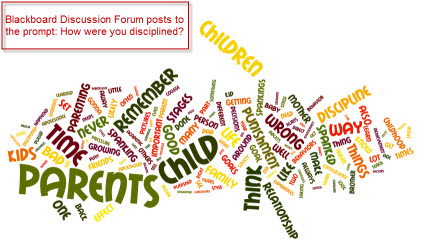As social networking and Web 2.0 continues to grow in popularity, some are asking: What is Web 2.0 anyway? From the Teaching Without Walls website:
Web 2.0 is a common term used to describe “version two” or the “second generation” of the internet. Web 2.0 is distinguished from web 1.0 in one very simply [sic] way: content may be easily created by users who are no longer required to be technical experts. Thus, web 2.0 is exceptionally promising and liberating for educators who too frequently feel trapped or overwhelmed by the speed of technology. Further, web 2.0 tools cultivate participatory, active learning activities and/or environments for students, facilitating exciting new ways to assess learning and engage students.
In this blog post I want to describe one Web 2.0 tool that, at first, I dismissed as frivolous. I may still come around to that opinion but, for now, I’m being more open-minded about it as several colleagues see a lot of value in the tool. The tool is Wordle which is described as a tool that automatically generates a word cloud from a word list you provide. Wordle has the attraction of being the simplest tool to use you could imagine. Just enter words and Wordle generates the word cloud and shows you which words were used most frequently. The more a particular word or term is used, the larger it appears in the word cloud. The interpretation is up to you. This has some potentially interesting and educational uses. Maybe. One way I used Wordle was to capture all the student posts in a Blackboard Discussion Board Forum as you can see in the graphic below. If there is interest, I can detail how I did this in another post.
The word cloud of student posts on the subject of discipline brought up some intriguing discussion connections that I could use to get students engaged with the topic. For example, while the word “parents” was the largest word in the Wordle, implying it was the word most often used in the student posts, the word “mother” was much larger than “dad.” This could lead to a consideration of the relative influence of mother and father in the students’ discipline histories. Other word comparisons could also lead into deeper discussions such as the word “children” being much larger than “adolescents” – is it true for most that more discipline is required when we’re younger? But aren’t we more confrontational with parents as teens? And what do we make of the fact that spanking, spanked, and punishment were fairly large and hence more frequently mentioned? And I couldn’t help feeling somewhat reassured that words like hurt, slapped, belt and so on were not evident.
So, while Wordle is not for everyone, it may strike some as an engaging way to get students interested in examining an issue or topic
